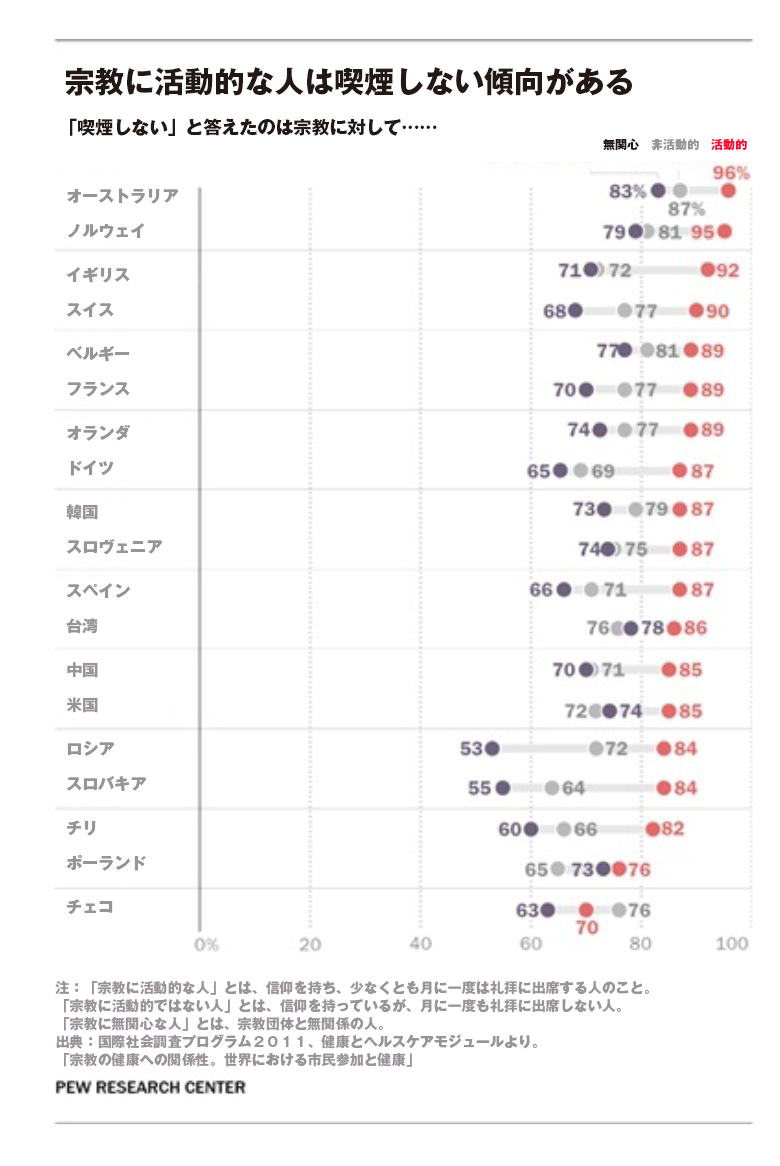米国のヒップホップ・アーティストのチャンス・ザ・ラッパーは昨年末の休暇の間、聖書を学んでタバコをやめた。「今は本当に気分がいい。ありがとう、父よ」と、インスタグラムに書いている。そこには聖書からの引用があり、タバコを吸わなかった日数も数えられていた。
[toggle]During his sabbatical at the end of last year, Chance the Rapper quit smoking while studying Scripture. “I feel really good right now, thank u Father,” he wrote on Instagram, where he shared passages of Scripture and counted days gone by without another cigarette.[/toggle]
チャンス・ザ・ラッパー(写真: Julio Enriquez)
このシカゴ出身の、音楽においても、公的な存在としても、キリストとの歩みを語るようになった彼は、研究者が信仰者の中に見いだす典型例の一人だ。信仰に燃えている信仰者は、より健康的な選択をし、より幸せな生を生きることを選ぶ傾向にある。
[toggle]The Chicago native, who has become outspoken about his walk with Christ in his music and public life, is one example of a trend researchers found among the faithful: Believers who are active in their faith tend to make healthier choices and live happier lives.[/toggle]ピュー研究所が最近発表した、宗教と幸福についての報告書によれば、宗教的習慣は特に喫煙をめぐって大きな違いを及ぼす。
[toggle]Religious habits make a major difference for smoking status in particular, according to a Pew Research Center report released today on religion and well-being.[/toggle]喫煙しないのは、宗教と密接な関係がない人が74%、月に一度も礼拝に出席しない人が72%だが、クリスチャンか、他の宗教伝統に属している自覚があり、月に一度は礼拝に出席する米国人では85%となっている。
[toggle]Among Americans who identify as Christian or another religious tradition and attend services at least once a month, 85 percent don’t smoke, compared to 74 percent of the religiously unaffiliated and 72 percent of those who attend services less often.[/toggle]この傾向は世界的にも同様で、調査対象となった19カ国のうち16カ国で、毎週の礼拝出席者は喫煙しない傾向にある(また、これらの大半の地域で、宗教に活動的な人はあまり飲酒はしないものの、そんなに大差はなかった)。
[toggle]The trend holds up around the world, where regular worshipers are less likely to smoke by a significant margin in 16 of 19 countries surveyed. (In most of those places, the active religious also drank less, but not by as wide a margin.)[/toggle]
世界価値観調査(2010~14年)と国際社会調査プログラム、およびピュー研究所のデータに基づく新しい報告で分析されている幸福度指標にあるのが喫煙と飲酒だ。
[toggle]Smoking and drinking were among several measures of wellbeing analyzed in the new report, based on data from the World Values Survey (2010–2014), the International Social Survey Programme, and Pew surveys.[/toggle]世界中で信仰を持たない人が増加しているにもかかわらず、宗教への参加──宗教への所属というより──は、高いレベルの幸福度と関係があるのは確実だと報告書は語る。
[toggle]Religious attendance—rather than religious affiliation—consistently linked to higher levels of happiness than the growing population of people around the globe who claim no faith. The report said:[/toggle]説明がどうであれ、「自分はとても幸せだ」と答えたのは、宗教に活動的な人、宗教組織に属している人の3分の1で、そうではない人は4分の1だった。
[toggle]Whatever the explanation may be, more than one-third describe themselves as very happy, compared with just a quarter of both inactive and unaffiliated Americans.[/toggle]データが入手可能な他の25カ国のうち、統計学的に有意な差で、「宗教と関係のない人より、宗教に活動的な人は幸せだ」と答えたのは約半数の国(12カ国)で、「宗教に活動的でない人よりも幸せだ」と答えたのはほぼ3分の1の国(9カ国)だ。
[toggle]Across 25 other countries for which data are available, the actively religious report being happier than the unaffiliated by a statistically significant margin in almost half (12 countries) and happier than inactively religious adults in roughly one-third (nine) of the countries.[/toggle]信仰者は、自身の苦しみに対処し、困難を耐え抜く助けを神に求めることができる。それは、共同体の活発なメンバーであろうとなかろうと同じだ。さらに、礼拝によく出席する人は、社会的なつながりによっても支えられている。ピュー研究所は以前の調査で、交友関係が重要な要素であることを示した。
[toggle]While believers can rely on God to help manage their suffering and endure hardship whether active members of congregations or not, those who regularly attend services have the added support of social connections. Earlier research, Pew pointed out, indicates that friendship is a key factor.[/toggle]「礼拝にきちんと出席する人は、良い時も悪い時も情報と助けを当てにすることができる」と報告書は述べる。それは、ウィスコンシン大学マディソン校のチェユーン・リム教授とハーバード大学のロバート・パットナム教授による研究の引用だ。「『社会的な助けが、幸福のほかの側面においてもきわめて重要』という考え方は、確かに広範な社会科学的研究によって裏づけられる」
[toggle]“Those who frequently attend a house of worship may have more people they can rely on for information and help during both good and bad times,” the report said, citing scholars Chaeyoon Lim of the University of Wisconsin-Madison and Robert Putnam of Harvard University. “Indeed, a range of social scientific research corroborates the idea that social support is pivotal to other aspects of well-being.”[/toggle]10年以上前、パットナムは、「独りボウリング」傾向(共同体の崩壊や個人主義化の傾向)に対して、規則正しく教会に通うクリスチャンに注目した。(明日に続く)
[toggle]More than a decade ago, Putnam looked to involved, churchgoing evangelicals in the US as a counter-narrative to his “bowling alone” trend.[/toggle]